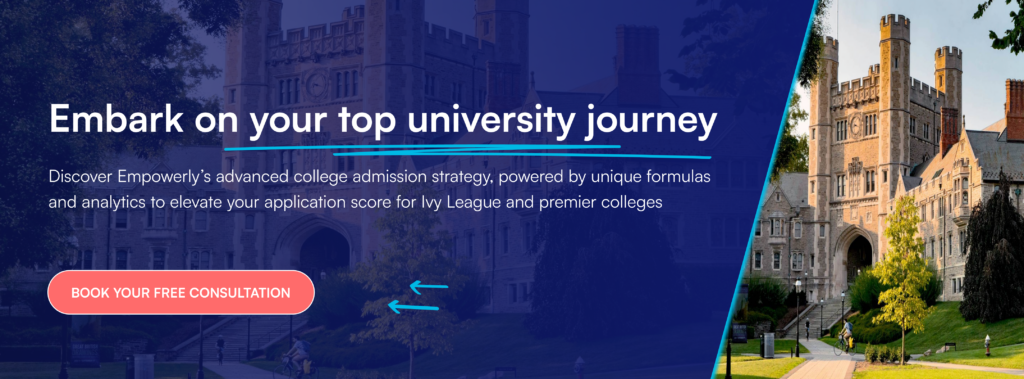You’re a straight-A student, but so are thousands of others. How will admissions know who you really are? Enter: the recommendation letter.
Typically written by a teacher or counselor, these professional letters provide a crucial element to the college application: an outside voice in your story. Many families underestimate their importance — but as a relatively unbiased assessment of your character, they can end up being a tiebreaker between two otherwise qualified students.
Don’t know who (or how) to ask for a college letter of recommendation? This article is full of tips on how to choose your recommender and what you can do to land a letter that can move the needle in college admissions.
What admissions officers look for
Letters of recommendation are a crucial part of a college application. But why?
Because they provide a personal perspective on your character, intellectual curiosity, and resilience — in essence, everything that grades and test scores alone can’t show. Even your personal essays can’t capture the same unbiased observations of your behavior in the classroom (and beyond).
So, when reading these, what do admissions officers actually look for? Here is an admissions perspective on what makes a letter of recommendation “good” versus “great”:
What admissions officers actually look for in recommendation letters
- Specific anecdotes that demonstrate your maturity (and show the person knows you)
- Positive observations about your work and work style, collaboration, or leadership skills
- Detailed references to your personal qualities and qualitative descriptions of the impacts of accomplishments
- Genuine expression and language; original comments (not robotic or generalized)
- Alignment with the profile presented in the rest of the college application
So, how do you go about getting a great one?
How to ask for letters of recommendation: the right way
Most colleges that require them will need two to three letters to be submitted for each student. Your best choices are teachers who taught you recently in core subjects. Outside of that, counselors and extracurricular advisors can also be good sources for supplemental voices.
So, what parts of this process can you, the student, control?

Choosing the right person
Start by listing potential recommenders from your academic or extracurricular life. Then narrow it down to those who know you best and meet the right criteria.
Who to ask
- Teachers or advisors from junior or senior year, or someone you’ve known for more than one year (but stayed in contact with over that time)
- Teachers or advisors for subjects in which you excel (and/or the subjects you want to study in college)
- Teachers or advisors who have witnessed your growth through high school
On the flip side, there are also recommender “red flags” that indicate you should avoid asking them.
Who not to ask
- Family, neighbors, friends
- “Big name” connections who don’t know you well
- Counselors or advisors who are overloaded and don’t have time to write another letter
Admissions can tell when a letter lacks personal insight, and it’s better to choose someone less “impressive” on paper who actually knows and believes in you. Here’s a quick test: do you feel comfortable asking this person for help and talking openly about your college application? If the answer is no, they aren’t the right fit. If the answer is yes, you’re on the right track.
Timing your request
Give your recommenders plenty of time: ideally, four to six weeks’ notice. This common courtesy ensures they can write you a thoughtful letter.
Why does timing matter? You’re asking for a favor. Teachers often write dozens of recommendations in their free time while simultaneously managing their regular workload. Asking at least a month in advance — not the night before — shows respect for their time and increases your chances of a stronger letter.
Think of it this way: asking the day before is like saying, “Will you please cancel whatever evening plans you had to write a letter talking about how great I am?” Not a great start. If you ask well in advance, you’re saying, “I respect your time and want to give you flexibility.” Which request do you think lands better?
Before you ask, prepare a “brag sheet” with a summary of your achievements, challenges you’ve overcome, and college goals to make the process easier for your recommender.
Here’s our suggested timeline.
- Freshmen and sophomores: Build and strengthen relationships with advisors.
- Juniors: Update your mentors on your hopes and plans for the next year(s).
- Summer before senior year: Prep your brag sheet.
- Seniors: Make the ask.
When it’s time to ask, make an appointment. Even if the person knows you well, a conversation helps them write a more personal letter. Use this time to remind them of your accomplishments, the challenges you have overcome, and your career goals. Finally, it’s always useful to talk about your college plans and what kind of hobbies you are excited about, to show your intellectual vitality and enthusiasm.

How to ask (P’s and Q’s)
As with all networking, always be polite and professional. It’s often best to ask in person, but a well-written email is also acceptable. Beyond just “please” and “thank you,” here are some more specific examples of how to phrase your request.
And remember: this isn’t just a transaction. Building relationships with mentors is valuable in and of itself. Students who treat these connections as meaningful — not just useful — tend to gain much more from the experience.
Hold up your end
Make it easy for them: prepare a document that helps your recommenders write the letter. This “brag sheet” should include a list of your achievements, activities, and specific qualities you want them to highlight. Don’t assume they’ll remember everything.
- Provide a brag sheet and a clear deadline.
- Waive your FERPA rights for credibility.
- Follow up politely if deadlines are approaching.
Say thank you
Remember to express your gratitude. A thank-you note or email after they submit the letter shows your appreciation for their time and effort, and keeps the door open for future opportunities.
Further reading
The process of asking for letters can be stressful. If you’re looking for a more detailed walkthrough of the whole kit and caboodle, a good guide can make it more manageable by providing a clear timeline and actionable tips.
Download your copy of Empowerly’s Guide to Letters of Recommendations for a handy PDF you can reference later.
Common mistakes to avoid
Even strong students can stumble when it comes to recommendation letters. As this video shows, it’s a little more complicated than just a “yes or no” question. The right preparation can make all the difference:
Here are some of the most frequent missteps that we see — and how you can avoid them.
– Waiting until the last minute.
Asking a teacher a week (or worse, a day) before the deadline almost guarantees a rushed letter. Instead of glowing anecdotes, you’ll get something generic because your recommender didn’t have time to reflect. As we mentioned earlier, you want to ask at least a month in advance — or earlier, if possible.
– Picking a teacher who barely knows you.
A letter from a teacher who gave you an A but can’t recall a single time you spoke in class won’t impress admissions officers. The best letters come from people who know your character, growth, and learning style — not just your transcript.
The same goes for classes where you were always tardy or handed in late assignments regularly. Please, please find someone happy to advocate for you in their letter.
– Writing your own draft for the teacher (bad idea).
Some students think they’re being helpful by drafting the letter themselves. In reality, this often backfires; colleges want authentic, third-party voices, not something that reads like a self-promotion piece. Even if you manage to write a passable letter that doesn’t sound like a high school student wrote it, you miss out on the chance for these letters to add something great, insightful, and new to your application. Which is a shame. A brag sheet is a much better way to do your part without overstepping.
– Forgetting to follow up politely.
Life happens. Teachers and counselors, who are real humans, are busy too, and sometimes your letter may slip down their to-do list. If they haven’t yet submitted the letter, a gentle reminder a week or two before the deadline is appropriate, just keep it courteous.
– Neglecting to say thank you.
It’s surprising how many students forget this step. A heartfelt thank-you note or email goes a long way in showing gratitude for your recommender’s time and effort. Plus, you may need their help again for scholarships, internships, or graduate school down the road.
The best recommendations are not about luck
Good recommendations don’t spring from nowhere; they come from a combination of preparation and professionalism. So don’t leave it up to chance. Our counselors help you identify the best recommenders, prepare brag sheets, and coach you on the perfect ask. Book a consultation today. With deadlines coming fast, now’s the time to prepare.
